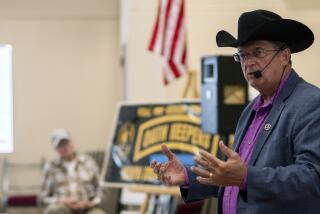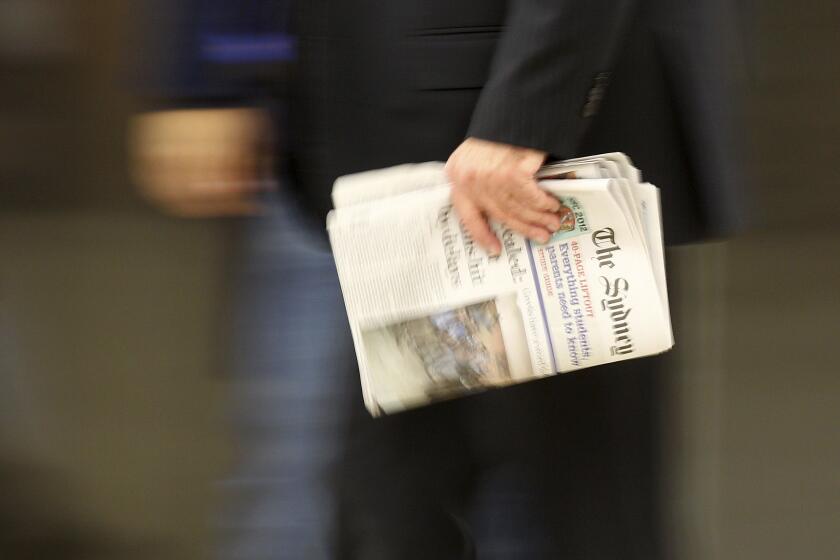Premier Takes Steps to Quell Basra Strife
Iraqi Prime Minister Nouri Maliki on Wednesday declared a monthlong state of emergency in the southern oil hub of Basra, saying he would deploy an army division to quell sectarian and political violence in the country’s second-largest city.
Basra, a predominantly Shiite Muslim seaport with a Sunni Arab minority, has suffered assassinations, attacks and counterattacks by militia and religious groups that have been vying for power for more than a year.
Vice President Tariq Hashimi, who accompanied Maliki to the city Wednesday, said Shiite militias had begun attacking one another, a development that could deepen divisions within Iraq’s leading Shiite bloc.
“What are these killings, assassinations and kidnappings? What is going on in this city that has sacrificed so much throughout its history, this city that has so many martyrs?” Maliki said in a nationally televised speech from Basra.
Even as the prime minister called for calm, U.S. officials expressed regret that American troops had shot and killed two Iraqi women -- one of them pregnant -- whose car had entered a restricted area north of Baghdad on Tuesday. The slayings threatened to increase anger at the military, which is investigating allegations that Marines massacred unarmed civilians in the western town of Haditha last year.
At least 16 people were reported killed by explosions or shootings Wednesday. That followed at least 45 deaths Tuesday.
Maliki flew to Basra out of concern that the city was becoming another front in violent sectarianism and that local disputes between the two leading Shiite parties there -- Al Fadila al Islamiya and the Supreme Council for Islamic Revolution in Iraq -- could deepen fissures in the national Shiite bloc.
“We hear about sectarian conflicts among the Sunni and Shiite. Aren’t we all Muslims?” Maliki said. “We were all victims of dictatorship -- who provoked such problems in this peaceful city?”
Violence increased in May after a Sunni tribal leader was killed after a meeting with Basra Gov. Mohammed Waeli.
Maliki imposed a monthlong curfew on the population, and Iraqi army units will assume control of security. The army will increase patrols and will control Basra’s entry points, officials said.
“The situation is very poor -- worse than you can imagine. Killings are taking place in the streets,” said Mohammed Ali, 22, a Shiite oil engineer. He said slayings in predominantly Sunni neighborhoods had sparked retaliations against Shiites.
U.S. and Iraqi leaders said the governor and police chief were to blame for failing to rein in militias working alongside -- and in some cases inside -- police units. One senior Iraqi official, who declined to be identified, said some of the violence was rooted in disagreements between Fadila and the Supreme Council for Islamic Revolution in Iraq.
Fadila, or the Islamic Virtue Party, boycotted the formation of the central government last month after other parties in the leading Shiite bloc, the United Iraqi Alliance, rejected its demand to run the powerful Oil Ministry. Basra is home to much of Iraq’s oil wealth.
Hashimi accused Shiite militias of profiting from oil smuggling in Basra and of squabbling with one another. Both the Badr Brigade, which has ties to SCIRI, and Al Mahdi militia, founded by militant cleric Muqtada Sadr, have large forces in Basra.
In his televised speech, Maliki warned that armed groups were creating insecurity throughout the country, and he urged Iraqis to rely on the nation’s police and military to deal with insurgents and criminals.
Mohammed Sadoon Abadi, chairman of the Basra City Council, said Basra’s problems differed little from those in the rest of Iraq, and he denied that assassinations and smuggling were taking place.
“I believe the security situation in Baghdad is more critical than Basra. The problems here are normal -- only scattered incidents here and there,” he said.
Meanwhile, the U.S. military said the women slain by troops had driven into a prohibited area near an observation post in Samarra. The area was clearly marked, and troops attempted several auditory and visual warnings before shooting to disable the vehicle, the statement said.
“Coalition forces later received reports from Iraqi police that two women had died from gunshot wounds, and one of the females may have been pregnant,” the military said. “The loss of life in these incidents is regrettable, and coalition forces go to great lengths to avoid them.”
The military said it was investigating the shooting.
A survivor of the incident who identified himself as a relative of the women told the Associated Press that he did not see any warnings, and said the post was new and unknown to many residents.
In other violence, the mayor of Muqdadiya, 25 miles northeast of Baqubah, was killed by a bomb planted outside his office window. Eight miles east of Baghdad, police found the body of a Sunni cleric who had been kidnapped the night before.
In Baghdad, a sportscaster for the television channel Al Iraqiya was shot to death. Three police officers were killed near a mosque in the capital. And 10 bodies were found in and around the Baghdad slum known as Sadr City.
*
Times staff writers Caesar Ahmed, Shamil Aziz, Suhail Ahmad and Saif Hameed, as well as correspondents in Baghdad, Baqubah and Basra, contributed to this report.
More to Read
Sign up for Essential California
The most important California stories and recommendations in your inbox every morning.
You may occasionally receive promotional content from the Los Angeles Times.










